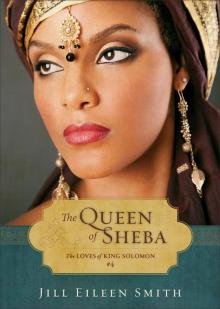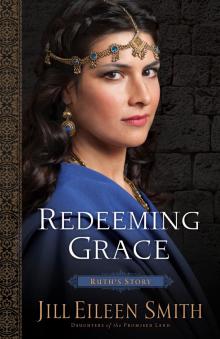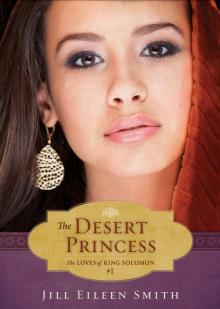- Home
- Jill Eileen Smith
The Shepherdess Page 2
The Shepherdess Read online
Page 2
“I made pomegranate wine today,” I said, hoping the subject would be pleasing. “Perhaps Dekel will invite your family to join ours and share it soon.” It was a hope I harbored, longing for the day when Dekel would see to my needs of marriage, hoping Yaron would be the one chosen for me to wed.
He glanced at my hands. I turned them faceup. “My fingers are still stained with juice.” I laughed. “I will have the pleasure of tasting it for a week.”
“Pomegranates are a lot of work to open and peel.” His look grew thoughtful. “I see the way they work you, Abishag. You deserve better.”
His kindness brought heat to my face, and I was suddenly grateful for the moon’s shadow to hide beneath. I shrugged. “They have many mouths to feed. It is understandable.”
“You should be tending a home of your own.” He did not look at me when he said it, and I didn’t know how to respond, so I kept quiet.
Silence grew weighted between us, and Yaron said no more on the subject. “I should get some sleep,” he said at last, pointing to the lamb. “She could keep me up in the night.”
I realized I could no longer justify staying with my sheep just across the wall. It would be unseemly. “And I should get home. They will miss me.” It wasn’t true, but I said it for something to say.
“Thank you for your help,” he said as I retreated a few steps from him. He did not attempt to rise to see me out.
“It was my pleasure.” I turned and hurried through the darkened paths toward my brothers’ house without a backward glance.
2
Weeks passed, and I saw no more of Yaron, but Lilach often spoke of him at mealtimes or when I passed her walking toward the well as I hurried to the fields. I did not like the gleam in her eyes nor the syrupy tone she used when his name brushed her lips, as though she knew a secret I could not share.
The wind whipped my headscarf askew, and I was glad of the distraction to my wayward thoughts. My brothers did not care about my heart’s longings, nor would my sisters-in-law want me to make a better match than their own daughters.
Please, Adonai, give me to Yaron.
It was a foolish prayer.
I removed the veil and hung it over one of the branches in Dekel’s vineyard, where I hurried to fill my first bucket with ripened grapes. More stains, darker this time, coated my fingers as the juice from some of the overripe fruit squirted into my hands. I plopped a grape into my mouth and savored the sweetness before spitting the seeds into the dirt. My beloved is mine and I am his. I hummed the new tune, but I did not repeat the words aloud.
“Always with a song on your lips, eh, Abishag?” I turned to see my sister-in-law Kelila standing behind me. “You should be more careful to keep quiet when you are alone. You give yourself away in this vineyard.” She sighed. “At least we always know where to find you.” She drew closer and extended a hand to take the full basket from me. I admit I was truly touched by her apparent concern for my safety.
“How can one not sing when there is such beauty all around us?” I met Kelila’s gaze, searching, but she gave no response. Instead, she set the full basket at her feet as if to unburden herself of the load. I stopped my work.
“Something is amiss. What is it?” A feeling of dread worked through me at the way her eyes would not meet mine.
“Don’t bother with the grapes now. Dekel wants you home. Clean yourself up before you come.” She picked up the basket again and turned. “Be quick about it.”
I stared at the second basket sitting at my feet. “What of the vineyard? Am I not to finish? It is still light.”
She did not look back. “Don’t argue, Abishag. Just come.” She hurried off then, and I stared at the space where she had just stood. Worry nudged me, but I shoved it aside. Dekel was likely in one of his moods. It was nothing.
I took my scarf from the branch and covered the hair that stubbornly refused to hold still within the combs, then bent to rub my hands in the grasses beneath the vines. If I was to hurry, I had no time to walk to the river to immerse in its cool waters or duck my head to listen to the rhythm of its rushing timbre. A sigh of longing pulsed within me. How I yearned to be free—to run, to twirl in the wind, and then to race into my beloved’s arms. My imagined beloved. For despite that one look and our brief friendship, even Yaron did not give me the false hope of his love.
Doubts and questions assailed me. Why did Dekel want me home?
For a swift moment I had the giddy thought that Dekel wanted to tell me that Yaron had come to ask for my hand! My heart leapt like a new bride as hurried images raced through my mind, and I saw all the ways my life could change for the better.
But as I emerged to the open field between the vineyard and Dekel’s house, the memories of Kelila’s tone and the look in her eyes returned. If Dekel had called me to see me wed, she would have gripped my hand and held excitement in her smile. Kelila was never so cruel as Batya, and I think at times she almost liked me. No, something else had gotten under Dekel’s skin, and I would face the force of it in a moment.
I straightened my back and lifted my chin as I made my way down the low hill.
Where a pack of camels stood outside the courtyard, bearing the standard of King David.
We had visitors.
My carefree spirit vanished as I ran toward home.
“Here she is.” Dekel, the one who held my fate, extended a hand toward me, though his gaze never left that of the men who sat on the cushions in our sitting area. “This is my sister, Abishag.”
I stared at Dekel for longer than I should have, before good sense and manners took hold of me. I turned to face the men and bowed. Heat crept up my neck as I glimpsed their perusal, and if I were not already tanned from the sun, I am certain they would have noticed a dark blush fill my cheeks. Their appreciative looks, though discreet, were all too obvious to me. I tugged at my slightly disheveled scarf and arranged it properly over my dark hair, tucking in a few stray strands that had escaped to brush my face.
“She is young,” said one of the men.
“And very beautiful,” said another.
I studied my bare feet, suddenly ashamed that I had not taken the time to wash them at the door. Why did my beauty matter to the king’s men? My heart beat faster at the thought. Had they come seeking a bride for one of the princes?
“And what will you offer in exchange for her?” Dekel’s voice thrummed a discordant note within me. I glared at him. Offer? Exchange? I willed him to meet my gaze, but he would not look my way.
“Trust me, my lord, if she is chosen, you will be well paid.” This from the first man, who stood, pulled three golden coins with the king’s seal out of a pouch, and placed them in Dekel’s outstretched hand. “If you agree to allow her to come to Jerusalem, there are seven more like this here.” He jiggled the leather pouch, the sound of coins clanging together unmistakable.
“And if she is chosen?” Dekel raised a brow, glancing my way. His mouth twitched in that smirk he had, as if he didn’t believe such a thing were possible.
“If she is chosen to be wife to King David, a messenger will bring you to Jerusalem to witness the writing of the ketubah. King David is a generous man, my lord.” The king’s servant, or steward, or whatever he was, began to tie the coin pouch again to his belt, then met my brother’s interested gaze.
Wife to King David? The question pounded suddenly in my head. I could not possibly go with these men. To marry the king? The very aged king? A knot formed like a fist in my middle, and the room seemed to sway around me. I sought a place to sit. Kelila’s arm caught me and steadied me, though I barely felt her touch.
“But why?” I could not stop the words any more than I could stop singing in the fields. “The king already has many wives.” I caught the frown on Dekel’s face. “I don’t understand why he seeks another.”
“If the king wants another wife, be glad of it, my sister.” I heard the warning in Dekel’s voice and knew he had decided my fate before I even walked th
rough the door of the house. “Such a marriage is a great privilege.” Dekel glanced at the king’s servant. “What happens to her if she is not chosen?”
I knew why he asked it, though my brother managed a smile as he said the words. He wanted to be rid of me and did not want me back to have to find someone else to wed me. Besides, no one could match what the king could pay.
“That depends, I suppose, on many factors,” the servant said. “The king’s wife Bathsheba will choose which girl marries the king.”
I looked up from staring at the belt I’d been absently twisting and glanced at Kelila. I could see by her raised brow that even she thought this highly unusual. But neither of us dared to say so.
“I wish I could explain more to you,” the man said, his tone suddenly kinder than it had been moments ago when the talk had been of coins and wealth to secure my purchase. “We, along with several other servants, have been sent throughout the land to find beautiful virgins. We are to bring them to Jerusalem. There one of them will be chosen. If your sister is the one picked, we will send for you.”
“But we keep the ten golden coins as a down payment in the meantime?” Dekel cared only for the money, not my loss. And I should view this as a great adventure. At last I would be free of this oppressive household.
But all I could see was Yaron’s form and handsome smile in my mind’s eye.
“Yes,” the man said. “I will give you the rest as soon as she is packed and ready to depart.”
Dekel seemed to consider this but a moment before he looked my way. “You heard the man.” He waved a hand at Kelila and me and motioned toward my chamber. “Go!”
I could not seem to lift my legs, which felt weighted and weak, but Kelila’s hand on my elbow urged me forward. She guided me down the hall to the small room I shared with my younger nieces.
“You should have washed your feet before you entered the house,” she scolded. “Whatever will we do with you?” She hurried to the small chest and pulled my few tunics from it, refolded them though they did not need it, and stuffed them into a basket my mother had left me. A few scarves I had saved from my mother were added to the pile, and before I could find my breath, I was packed.
“Shouldn’t I bathe in the river first? Wash my clothes?” I looked at the stained garments, at the juice still clinging to my fingers from the grapes I’d left untended in the vineyard. It suddenly occurred to me that I would not get to taste the pomegranate wine I had worked so hard to make.
“There isn’t time. Before you arrived, I heard the men say they must be on the road before nightfall.” Kelila turned me to face her, and for the first time in many a memory, I glimpsed tears in her eyes. Tears for me? “I will miss you,” she said, touching my cheek. “Do not fear to go with them. There is a woman who oversees the girls who has been keeping Batya’s company since they arrived. You will not be alone with them.”
“They carry the king’s insignia on their camels.” I am not sure why that thought crossed my mind at that moment. Perhaps to assure us both that my brother had not simply sold me to men who would abuse me.
“They already have several girls riding with them, waiting with another woman on the outskirts of town.” Kelila adjusted my headscarf and, in a moment of spontaneity, removed the clasp from her own and attached it to mine. “There. Perhaps now you will remember to keep it closed and protect your face from the sun.”
“How do you know this? About the other girls?” My mind was swirling with too many thoughts, and I could not take them all in. Was this truly happening to me?
Kelila took my hand and slowly led me toward the door. “Haim went with one of the men to the camp.” She stopped at the threshold, where I took one last look at the room I had slept in since my parents’ death. Kelila thrust the basket into my arms. “Come. Delaying it will only make it harder.”
I followed her in silence. Her husband, my brother Haim, was my favorite, and I knew he would not allow Dekel to send me off without forethought. I took small comfort in that fact.
I swallowed my fear as I hugged each of my nieces and nephews goodbye. Even my sisters-in-law gave me a parting kiss, but only Haim held me close. “Be watchful, but do not fear,” he whispered against my ear. “They have assured me you will be well cared for.”
Tears stole my ability to speak, so I simply nodded and hoped he could see the gratitude in my gaze. He looked away after a quick kiss to my cheek. “God bless you, my sister.” He said this aloud, and the rest of my family repeated his words, surprising me. Perhaps they cared for me after all. But I did not allow myself to dwell on that thought. If I stayed, things would prove to be no different, and I would never find the acceptance I sought from this place.
Oh, but I did not want to leave!
I followed the king’s men, my thoughts jumbled, my heart cold, a lifeless thing. What was to become of me? What of Yaron and the future I had imagined between us? Lilach would surely tell him of my departure, and I could almost hear the glee in her tone. My heart beat painfully within me as one of the men helped me climb atop a camel and sit on the hump behind the female servant who had bent Batya’s ear. No doubt Batya had filled her head with all manner of lies against me. I wondered why I cared what she had said.
We soon found ourselves on the outskirts of town, where more camels and more young beautiful virgins waited. The chief servant, the man who had arranged my purchase from Dekel, gave orders for us to head south toward Jerusalem. Apparently Shunem was as far north as they intended to go.
Sorrow threatened as I saw the edges of my village disappear and the landscape change. I should not miss a family such as mine, but I did. Loneliness and fear of the unknown filled my thoughts with each sway of the camel’s steps. But the rhythm of movement soon dulled my senses, and I was glad of the seat affixed to the beast’s back to keep me from falling headlong into the dust. I dozed now and then but did my best to keep my gaze fixed on the ever-changing sights of God’s creation. Lush greens gave way to even greener forests, and the sure-footed camels clopped easily through the low-lying wadis. I knew from listening to my brothers speak that camels could run much quicker than they were going now, but thankfully the king’s men did not force such speed.
The servant I sat with said little to me as we rode, and I was glad of the solitude. I listened instead to the music of the land as we passed, to the rhythm of the camel’s pacing and its steady breaths. A hawk soared overhead, and the sun dipped in brilliant orange hues toward the horizon. At last we came to rest near a hilly area filled with many a cave to keep us safe from predators and the cool night air.
“You will be given new clothing when we get to the palace,” the female servant said to the ten of us who huddled in one of the caves sometime later. They had fed us with lentil stew and fresh olives picked no doubt from one of the groves in Shunem. “Tonight, and until we reach the palace, take these to keep you warm.” She handed each of us a blanket of the softest wool I had ever seen. If this was how King David treated his servants, what must a wife or concubine enjoy?
But I could not entertain that thought.
I did not want to wed the aged king.
“I wonder what will happen to those of us who are refused.” The girl who spoke had said little during the evening meal. Now she stood at my side, her large dark eyes filled with concern. “I am Mica.”
“And I am Abishag.” I nodded and smiled at her. She seemed younger than I by several years, though I admit I am a poor judge of age. “What village are you from?”
“Just outside of Shunem. My father lives in the hills, and we would not have known of the king’s men if my father had not taken me to market today.” She looked away, her countenance suddenly sad. She leaned close. “I wish we had stayed in the hills.”
I placed a hand on her shoulder and motioned to a corner of the cave where we could spread our blankets. “We cannot change it now,” I said, hoping to encourage her. “I doubt there is a girl among us who wants to wed the king.”
“No, but I would guess there are many among us who would not mind marrying Prince Solomon.” She smiled, and I wondered at her dreamy expression.
“Have you seen Prince Solomon?” Little news traveled so far north, and I could not recall a time when the prince or his entourage had passed through our small town.
She shook her head. “No, but I have heard tell he is the most handsome of the king’s sons. And all of them are good-looking men.”
“So you have seen his other sons?”
She offered a sheepish look. “No.”
“Then you do not know for sure.”
“It is what they say.”
The gossips said a lot of things that weren’t true. We were too young to recall King David’s glory days, but we had heard plenty of stories of his fall, of Prince Absalom’s attempt to steal the kingdom, and of the king mourning the death of three sons.
If the king had not taken Bathsheba . . .
Bathsheba. She would pick which of us would become the king’s new wife.
My heart pulsed to a tune I did not understand. Why would the king seek a new wife? If the comments around the meal tonight proved true, King David was not only aged, he was frail and ill. I thought of my father, taken in my youth. He had been younger than the king was now. How could I, a girl of only fifteen summers, wed a king of more than sixty?
“I would gladly marry a prince if they do not pick me,” Mica said, pulling my thoughts around to her again. “But they will pick you above any of us, if I had to guess. You are far more beautiful than all of us combined.” She said the words with no hint of guile, though I searched her gaze to assess that very thing.
“I am not beautiful,” I said without thinking. “That is, I am not thought so by anyone I know, so how can I be? Beauty is in the fields, in the vineyards, with the sheep. Beauty surrounds us, and it draws music from my heart. My appearance could not possibly compare to God’s creation.”

 Star of Persia: Esther's Story
Star of Persia: Esther's Story The Shepherdess
The Shepherdess Abigail (The Wives of King David Book #2): A Novel
Abigail (The Wives of King David Book #2): A Novel The Queen of Sheba
The Queen of Sheba Michal
Michal Rebekah
Rebekah A Passionate Hope--Hannah's Story
A Passionate Hope--Hannah's Story Daughter of the Nile
Daughter of the Nile Rachel
Rachel Sarai
Sarai Redeeming Grace: Ruth's Story
Redeeming Grace: Ruth's Story The Desert Princess
The Desert Princess The Prophetess - Deborah's Story
The Prophetess - Deborah's Story